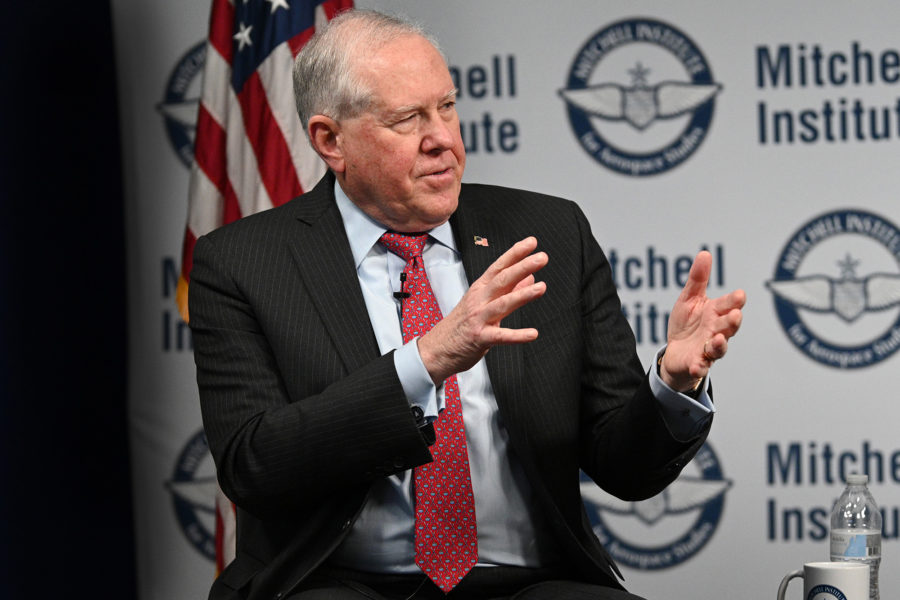A week after saying the Department of the Air Force was not as prepared as it could be for war against an adversary like China, Air Force Secretary Frank Kendall pledged a sweeping review of Air Force and Space Force organization, training, supply, and readiness in an open letter to Airmen and Guardians released Sept. 5.
“We will conduct a major initiative over the next several months to identify and implement the changes needed to meet our pacing challenge,” which the National Defense Strategy has identified as China, Kendall said, with the ultimate goal of deterring Beijing from starting a war with the U.S.
“This initiative will involve a comprehensive look at all aspects of how we organize, train, and equip the Air Force and Space Force,” Kendall wrote. “A centralized planning effort will be led from the combined Department of the Air Force Headquarters with support and extensive input from our Major Commands and Field Commands,” he said, adding that the review will be completed in January 2024.
Under that timetable, the review would conclude after the Department of the Air Force finishes building its fiscal year 2025 budget request, but before it is sent to Capitol Hill.
An Air Force spokesperson could not immediately say if it is Kendall’s intention that the review informs or provides the basis for the fiscal 2025 budget, and whether the major changes it identifies will have to wait until the 2026 submission.
Kendall’s letter likely foreshadows his remarks at next week’s Air, Space and Cyber conference hosted by AFA in National Harbor, Md. Senior USAF officials have also suggested he will make a major announcement about the Air Force’s plan for Collaborative Combat Aircraft, and how they will tie in with the Pentagon’s larger “Replicator” effort to produce unmanned, “attritable” fighting vehicles, watercraft, and aircraft.
“It has been clear to me for over a decade that China is intent on fielding a force that can conduct aggression in the Western Pacific and prevail, even if the United States intervenes,” Kendall wrote. “While China has focused on creating the regional conventional forces it believes it needs, China is also dramatically expanding its nuclear force and military space capabilities. We cannot sustain deterrence by standing still,” he said.
Kendall said this self-assessment will “not be easy,” as the “habits and structures” of the Air Force and Space Force are well established.
Upon completion, the review will be followed by “an implementation phase,” the length of which Kendall did not specify.
Kendall noted that he, acting Undersecretary Kristyn Jones, Chief of Staff Gen. Charles Q. Brown, Jr., Chief of Space Operations Gen. B. Chance Saltzman, Chief Master Sergeant of the Air Force Joanne Bass, and Chief Master Sergeant of the Space Force Roger Towberman, have all voiced variations on the same theme with their various mottos and mantras: “We must be ready for a fight unlike anything all of us serving today have ever seen, and that requires both unity of effort and change.”
In an Aug. 30 “Coffee Talk” with Bass streamed on Facebook, Kendall said his concern is that the China threat “is here already” and the Department of the Air Force is not fully ready and organized to deal with it.
“Are we organized to deal with that threat? Are we training to deal with that threat? Are we prepared in terms of how we structure a lot of different functions within the Department of the Air Force, for both the Air Force and Space Force, so that we could deal with that threat? If we were asked tomorrow to go to war against a great power, either Russia or China, would we be really ready to do that?” Kendall asked. “And I think the answer is not as much as we could be, by a significant margin. And we’ve got to start spending a lot of time thinking about that and figuring out what we’re going to do about it.”
In his Sept. 5 letter, Kendall said the DAF has focused for the last two years “on establishing the modernization programs we need to maintain our conventional superiority,” under the organizing structure of his seven Operational Imperatives. That work has “produced the new investments and programs included in the FY’24 Defense Budget,” he said, calling this work unfinished but “well begun.”
“The movement to reoptimize for Great Power Competition has already started; I see evidence of that everywhere I go,” Kendall wrote. “But we must move faster and more comprehensively. “We must identify all the changes we need to make and accelerate them.”
At the same time, Kendall offered no criticism of Airmen, Guardians, or their leadership, saying he is in awe of them, DAF civilians “and the families that love and nourish them.”
“We are second to none,” Kendall wrote, “but we cannot afford complacency.”
Kendall directed every member of the DAF to immediately size up their organizations and answer the question: “if asked to go to war today against a peer competitor, are we as ready as we could be? What can we change in each of our units and organizations to be more ready?”
These questions, he said, aren’t academic or theoretical but are vital to deterrence.
“This is why we all serve,” he wrote, “To be ready at any time to undertake the most stressing mission we may be given.”
While the goal is deterrence, “deterrence rests firmly on our readiness and ability to win. No one wants a Great Power conflict, and no one can predict when one might occur, but come it may, and we must be as ready as we can be—now, tomorrow, and every day.”
